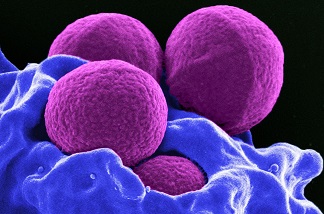SARS-CoV-2 Causes Deficient Phagocytosis In Circulating Monocytes, Paving The Way For Opportunistic Fungal Infections Including Mucormycosis
COVID-19 News - Deficient Phagocytosis In Monocytes Apr 14, 2023 2 years, 1 week, 4 days, 5 hours, 32 minutes ago
COVID-19 News : The SARS-CoV-2 pandemic has highlighted the vulnerability of the human immune system to opportunistic infections, especially among those with severe illness. One such opportunistic infection is mucormycosis, a life-threatening fungal infection that has been increasingly reported in COVID-19 patients, particularly in India as covered in numerous past
COVID-19 News articles. The connection between COVID-19 and mucormycosis raises questions about the specific immune mechanisms that make individuals more susceptible to this dangerous fungal infection.

In a new study, researchers from India delve into the potential links between SARS-CoV-2 infections, monocyte function, and the increased risk of mucormycosis in COVID-19 patients.
A small cohort of Indian patients suffering from COVID-19-associated mucormycosis (CAM) and COVID-19 patients without mucormycosis were studied to examine the relationship between cytokine regulation and myeloid phagocyte function. Plasma samples were used to measure a panel of 48 cytokines, and CD14+ monocytes were isolated for flow cytometric phagocytosis assays and global transcriptome analysis.
The multiplex cytokine analysis revealed a reduction in a subset of cytokines in CAM patients, which are known to potentiate the activation, migration, or phagocytic activity of myeloid cells.
This reduction was compared to COVID-19 patients who did not contract mucormycosis. A significant deficiency in phagocytic function was observed in peripheral blood CD14+ monocytes from CAM patients compared to healthy individuals.
The monocyte transcriptome analysis also showed that pathways related to endocytic pathways, phagosome maturation, and cytoskeletal regulation of phagocytosis were significantly downregulated in CAM patients.
These study findings suggest that a deficiency in the phagocytic activity of monocytes, a critical mechanism for antifungal host defense, is present in patients with CAM. This result is in concordance with the specific cytokine signature and monocyte transcriptome.
Efficient phagocytosis by myeloid lineage cells, including circulating monocytes and neutrophils, is a key mechanism for antifungal innate immunity. Defects in the numbers or functions of phagocytes markedly increase the susceptibility to mucormycosis.
The study also found that CD14+ monocytes isolated from CAM patients were significantly deficient in phagocytosing latex beads compared to healthy controls.
Further analysis of the gene expression landscape of the circulating monocytes revealed that pathways related to systemic inflammation and the antifungal immune response were upregulated in the monocytes from CAM patients.
In contrast, pathways related to endocytosis, phagosome maturation, and cytoskeletal regulation linked to phagocytosis were significantly downregulated.
The deficiency in monocyte phagocytosis and the disrupted expression of C-type lectin receptors and key lysosomal enzymes suggest a functional deficiency of phagolysosomal proteolysis and lipolysis in monocytes from CAM patients. The downregulation of these genes and p
athways may underlie the increased susceptibility to mucormycosis in COVID-19 patients.
This study's limitations include the small cohort size and the unbalanced sex representation in the groups. Despite these limitations, the study findings provide crucial insight into the potential immune evasion mechanisms in COVID-19 that increase susceptibility to mucormycosis and possibly other fungal infections.
Further research is needed to confirm these findings and to explore potential biomarkers for detecting susceptibility to mucormycosis in COVID-19 patients and other viral infections.
In conclusion, the impact of SARS-CoV-2 infections on monocyte function may play a critical role in the increased susceptibility to opportunistic fungal infections, such as mucormycosis. The downregulation of pathways related to endocytosis, phagosome maturation, and cytoskeletal regulation in monocytes of CAM patients appears to contribute to the impaired phagocytic activity necessary for effective antifungal defense.
The findings of this study highlight the importance of understanding the complex interplay between viral infections, such as COVID-19, and the human immune system. This understanding can help inform the development of new therapeutic strategies to combat opportunistic infections and improve patient outcomes.
Further research should focus on expanding the cohort size, ensuring more balanced sex representation, and exploring additional factors that might contribute to the susceptibility to mucormycosis in COVID-19 patients.
Investigating the impact of different SARS-CoV-2 variants on monocyte function and the incidence of opportunistic infections will also be essential in understanding the evolving nature of the virus and its effects on the human immune system.
In addition, identifying potential biomarkers for detecting susceptibility to mucormycosis in COVID-19 patients could lead to more effective screening and targeted interventions to prevent and treat this life-threatening fungal infection. A better understanding of the interactions between viral infections and the immune system will be crucial for managing the ongoing pandemic and preventing future outbreaks of opportunistic infections.
The study findings were published in the peer reviewed journal: mBIO (A Journal of the American Society For Microbiology.)
https://journals.asm.org/doi/10.1128/mbio.00590-23
For the latest
COVID-19 News, keep on logging to Thailand Medical News.
